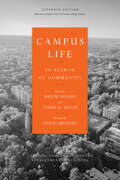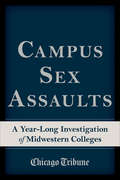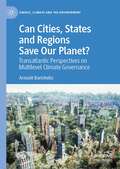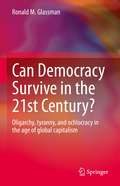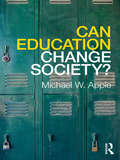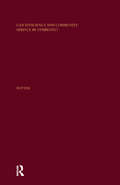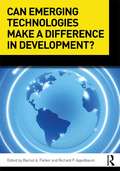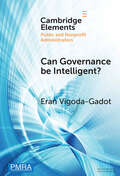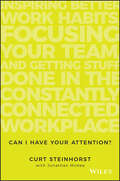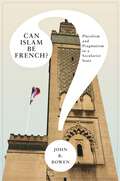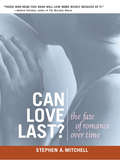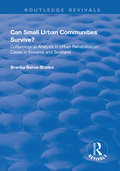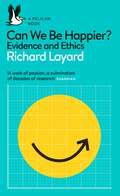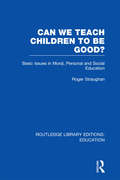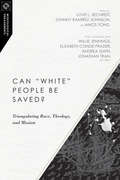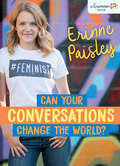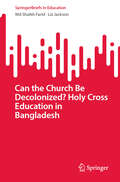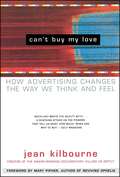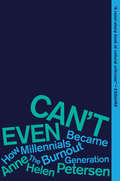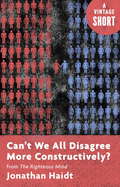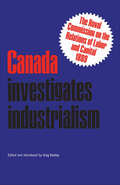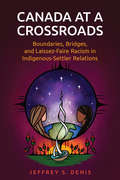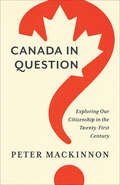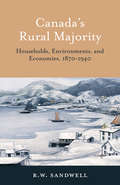- Table View
- List View
Campus Life: In Search of Community—Expanded Edition
by Drew Moser Carnegie Foundation for the Advancement of TeachingIn 1990, under the direction of Ernest Boyer, the Carnegie Foundation for the Advancement of Teaching published a classic report on the loss of a meaningful basis for true community on college campuses—and in the nation. Now this expanded edition of Campus Life: In Search of Community reintroduces educational leaders to the Boyer report's proposals while offering up-to-date analysis and recommendations for Christian campuses today. Editors Drew Moser and Todd C. Ream have assembled pairs of academic and student-development leaders from top Christian colleges to offer a hopeful update on the practical contributions of Christian higher education to the practice of community. This volume includes new chapters, the long out-of-print Boyer report in its entirety, and a discussion guide to facilitate team conversations. Higher education now stands at a critical point, yet the contributors to this expanded edition of Campus Life see current challenges as an opportunity to revive Boyer’s commitment to its formative power. Contributors include: Mark L. Sargent and Edee Schulze of Westmont College Randall Basinger and Kris Hansen-Kieffer of Messiah College Brad Lau and Linda Samek of George Fox University Stephen T. Beers and Edward Ericson III of John Brown University Paul O. Chelsen and Margaret Diddams of Wheaton College Doretha O'Quinn and Tim Young of Vanguard University Christian higher education now stands at a critical point, yet the contributors to this expanded edition of Campus Life see current challenges as an opportunity to revive Boyer's commitment to understanding the formative power of Christian higher education.
Campus Sex Assaults
by Chicago Tribune StaffIn September 2010, St. Mary's College freshman Elizabeth "Lizzy" Seeberg was found dead, a victim of an apparent suicide from prescription medication, mere days after alleging she had been sexually attacked by a Notre Dame football player. Starting in November of that year, the Chicago Tribune began reporting on this case that was up until that point not publicly acknowledged by the University of Notre Dame. Over the course of the next year, Tribune journalists and investigators produced a series of articles focusing on this case--and the cases of other sexual assault victims on Midwestern university campuses7mdash;leading to new investigations and subsequent reforms at schools across the region.Campus Sexual Assaults is a gripping and important piece of investigative journalism, revealing disturbing primary materials from cases and shocking personal interviews with the victims. The yearlong investigation shed light on the antiquated and obfuscated reporting and prosecuting practices of major Midwest colleges and universities, going so far as to discover that Notre Dame campus authorities did not even promptly investigate the alleged assault that occurred days before Lizzy Seeberg's death. Campus Sexual Assaults goes on to investigate similar trends in under-reporting and under-prosecuting sexual assaults on campuses across the country.Part 1 of Campus Sexual Assaults reports on the Seeberg case as it unfolded, and ends with the county prosecutor's decision that there would be no charges, since the victim's death made her statements inadmissible in court. Part 2 has a wider focus, as the Tribune reports on another similar attack at Notre Dame and a survey finding that few people accused of sexual violence on college campuses are ever convicted. Part 3 deals with reforms at Notre Dame and similar problems at Marquette University.The powerful stories told in Campus Sexual Assaults by the survivors and families victimized by these attacks are moving as much as they can be upsetting. After months of reporting and research on the Seeberg case and others like it, the Tribune's investigations sparked new legal investigations and subsequent reforms at the campuses in question. This collection of articles and investigative reports is a touching, in-depth look at an endemic problem at universities across America and should be required reading for not only campus and sexual health educators, but for university audiences and concerned readers everywhere.
Can Cities, States and Regions Save Our Planet?: Transatlantic Perspectives on Multilevel Climate Governance (Energy, Climate and the Environment)
by Arnault BarichellaThis book examines the potential for cities, states and regions to take decisive action on climate change at the local level. Local action constitutes an essential component of global efforts to keep temperatures below the 2°C Paris Agreement threshold. Focusing on three green municipal leaders - New York, Boston and Paris - this volume examines their multilevel interactions with higher governance echelons in the United States and France. Even though these countries are located on different continents, similar patterns emerge on both sides of the Atlantic. This book explores the key role of municipalities and sub-state entities in shaping the climate policy agenda vis-à-vis national governments in the US and France. It argues that inadequate articulation of multilevel governance may jeopardize efforts to limit global temperature increase below the 2°C threshold by the end of the century.
Can Democracy Survive in the 21st Century?: Oligarchy, tyranny, and ochlocracy in the age of global capitalism
by Ronald M. GlassmanThis book analyzes the many threats to democracy that exist in the 21st century and tries to understand how democracy can survive economic, social and political crises. It focuses on issues of oligarchy, tyranny, totalitarianism, and ochlocracy. It discusses how these forms of governance manifested themselves in ancient and medieval worlds, and how socio-economic transitions in the 21st century have created conditions that increasingly pose similar threats to modern democracy. The author discusses broad transitions in the contemporary world: economic transition to advanced, high technology capitalism; cultural transition from traditional religious and family values to norms focusing on racial equality, gender and transgender equality and liberation, and multiculturalism; also, transition from the traditional religious worldview to rational-scientific worldview, and from religious morality to secular humanist ethics. These taken together undergird the political transition from traditional authority, involving monarchy and aristocracy, to rational-legal authority, involving constitutional law and democratic participation. The book shows, through extensive country discussions, that whenever these transitions become difficult, undemocratic forms of governance may emerge and override democracy. Authored by an expert in the field, this book touches upon an especially topical theme in the contemporary world and is of interest to a wide readership across the social sciences, from researchers and students to discerning laypersons.
Can Education Change Society?
by Michael W. AppleDespite the vast differences between the Right and the Left over the role of education in the production of inequality one common element both sides share is a sense that education can and should do something about society, to either restore what is being lost or radically alter what is there now. The question was perhaps put most succinctly by the radical educator George Counts in 1932 when he asked "Dare the School Build a New Social Order?", challenging entire generations of educators to participate in, actually to lead, the reconstruction of society. Over 70 years later, celebrated educator, author and activist Michael Apple revisits Counts’ now iconic works, compares them to the equally powerful voices of minoritized people, and again asks the seemingly simply question of whether education truly has the power to change society. In this groundbreaking work, Apple pushes educators toward a more substantial understanding of what schools do and what we can do to challenge the relations of dominance and subordination in the larger society. This touchstone volume is both provocative and honest about the ideological and economic conditions that groups in society are facing and is certain to become another classic in the canon of Apple’s work and the literature on education more generally.
Can Efficiency and Community Service Be Symbiotic?: A Longitudinal Analysis of not-for-profit and for-profit Hospitals in the United States (Health Care Policy in the United States)
by Sharyn PotterFirst published in 2000. Routledge is an imprint of Taylor & Francis, an informa company.
Can Emerging Technologies Make a Difference in Development?
by Richard P. Appelbaum Rachel A. ParkerIn this innovative and entirely original text, which has been thoughtfully edited to ensure coherence and readability across disciplines, scientists and practitioners from around the world provide evidence of the opportunities for, and the challenges of, developing collaborative approaches to bringing advanced and emerging technology to poor communities in developing countries in a responsible and sustainable manner. This volume will stimulate and satisfy readers seeking to engage in a rich and challenging discussion, integrating many strands of social thought and physical science. For those also seeking to creatively engage in the great challenges of our times for the benefit of struggling farmers, sick children, and people literally living in the dark around the world, may this volume also spark imagination, inspire commitment, and provoke collaborative problem solving.
Can Governance be Intelligent?: An Interdisciplinary Approach and Evolutionary Modelling for Intelligent Governance in the Digital Age (Elements in Public and Nonprofit Administration)
by Eran Vigoda-GadotIntelligence is a concept that occurs in multiple contexts and has various meanings. It refers to the ability of human beings and other entities to think and understand the world around us. It represents a set of skills directed at problem-solving and targeted at producing effective results. Thus, intelligence and governance are an odd couple. We expect governments and other governing institutions to operate in an intelligent manner, but too frequently we criticize their understanding of serious public problems, their decisions, behaviors, managerial skills, ability to solve urgent problems, and overall governability wisdom. This manuscript deals with such questions using interdisciplinary insights (i.e., psychological, social, institutional, biological, technological) on intelligence and integrating it with knowledge in governance, administration, and management in public and non-profit sectors. We propose the IntelliGov framework, that may extend both our theoretical, methodological, analytical, and applied understanding of intelligent governance in the digital age.
Can I Have Your Attention?: Inspiring Better Work Habits, Focusing Your Team, and Getting Stuff Done in the Constantly Connected Workplace
by Jonathan Mckee Curt Steinhorst"A must read for anyone in the business of leading others."Ken May, CEO of Top Golf; former CEO of Fedex"If you want your team to stay focused, you will want to read Can I Have Your Attention?"Chester Elton, New York Times Best-Selling author of All In, The Carrot Principle and What Motivates MeInspire better work habits. Focus your team. Get stuff done in the constantly connected workplace.As our workloads expand, attention has never been more valuable. Or more difficult to keep.In Can I Have your Attention?, Curt Steinhorst shows business leaders how to cut through the noise and get their employees back to work. Curt has spent years helping Fortune 500 companies overcome distraction and achieve focus. With technology creating endless opportunites to "improve productivity", people spend so much time responding to the interruptions that they've lost the ability to focus and do their jobs. Yet, the potential for harnessing the power of your team's attention has never been greater--if you can capture it.You'll learn how to: Implement a comprehensive organizational strategy to increase focus and overcome digital distraction. Take back control of the technology in your organization and life. Establish a Communication Compact, defining how, when, and why your team will communicate with each other. Create a "vault" to increase productivity, decrease stress, and boost your creativity. Free yourself and your employees from the never-ending flood of emails and messages. Achieve unmatched focus in the age of distraction. The smartphone isn't going away. Learn the simple rules and guidelines that will improve focus and create the mental space needed for your people to work to their full potential.
Can Islam Be French?: Pluralism and Pragmatism in a Secularist State (Princeton Studies in Muslim Politics #43)
by John R. BowenCan Islam Be French? is an anthropological examination of how Muslims are responding to the conditions of life in France. Following up on his book Why the French Don't Like Headscarves, John Bowen turns his attention away from the perspectives of French non-Muslims to focus on those of the country's Muslims themselves. Bowen asks not the usual question--how well are Muslims integrating in France?--but, rather, how do French Muslims think about Islam? In particular, Bowen examines how French Muslims are fashioning new Islamic institutions and developing new ways of reasoning and teaching. He looks at some of the quite distinct ways in which mosques have connected with broader social and political forces, how Islamic educational entrepreneurs have fashioned niches for new forms of schooling, and how major Islamic public actors have set out a specifically French approach to religious norms. All of these efforts have provoked sharp responses in France and from overseas centers of Islamic scholarship, so Bowen also looks closely at debates over how--and how far--Muslims should adapt their religious traditions to these new social conditions. He argues that the particular ways in which Muslims have settled in France, and in which France governs religions, have created incentives for Muslims to develop new, pragmatic ways of thinking about religious issues in French society.
Can Love Last?: The Fate of Romance over Time
by Stephen A. Mitchell"A beautiful and brilliant reexamination of love and its perils."--Barbara Fisher, Boston Globe Common wisdom has it that love is fragile, but leading psychoanalyst Stephen A. Mitchell argues that romance doesn't actually diminish in long-term relationships--it becomes increasingly dangerous. What we regard as the transience of love is really risk management. Mitchell shows that love can endure, if only we become aware of our self-destructive efforts to protect ourselves from its risks. "Those who read this book will love more wisely because of it."--Andrew Solomon, author of The Noonday Demon "[A] work on romance that is rich and multi-layered."--Publishers Weekly "Cheerful, open, and humane--you'd definitely have wanted him as your analyst."--Judith Shulevitz, The New York Times Book Review "[T]houghtful, compassionate, and profoundly optimistic."--JoAnn Gutin, Salon.com
Can Russia Modernise?
by Alena V. LedenevaIn this original, bottom-up account of the evolution of contemporary Russia, Alena Ledeneva seeks to reveal how informal power operates. Concentrating on Vladimir Putin's system of governance - referred to as 'sistema' - she identifies four key types of networks: his inner circle, useful friends, core contacts and more diffuse ties and connections. These networks serve 'sistema' but also serve themselves. Reliance on networks enables leaders to mobilise and to control, yet they also lock politicians, bureaucrats and businessmen into informal deals, mediated interests and personalised loyalty. This is the 'modernisation trap of informality': one cannot use the potential of informal networks without triggering their negative long-term consequences for institutional development. Ledeneva's perspective on informal power is based on in-depth interviews with 'sistema' insiders and enhanced by evidence of its workings brought to light in court cases, enabling her to draw broad conclusions about the prospects for Russia's political institutions.
Can Small Urban Communities Survive?: Culturological Analysis in Urban Rehabilitation - Cases in Slovenia and Scotland (Routledge Revivals)
by Branka Berce-BratkoThis title was first published in 2001. Throughout the post-war period, there has been much activity in the conservation and renewal of old town centres throughout Europe. A considerable body of knowledge has been built up on the technical side of rehabilitation over a period of 40 years, but little attention has been paid to related societal and cultural aspects. More often than not this results in a degree of failure in the rehabilitation process. This is an exploration of how the planning and design of urban areas might be improved by the incorporation of culturological analysis within the town planning process. European practice in residential rehabilitation and conservation is renewed in order to gauge what progress has been made, with particular emphasis on solutions and remedies associated with cultural, ethnicity and minority issues.
Can We Be Happier?: Evidence and Ethics (Pelican Books)
by Richard Layard George WardFrom the bestselling author of Happiness and co-editor of the annual World Happiness ReportMost people now realize that economic growth, however desirable, will not solve all our problems. Instead, we need a philosophy and a science which encompasses a much fuller range of human need and experience.This book argues that the goal for a society must be the greatest possible all-round happiness, and shows how each of us can become more effective creators of happiness, both as citizens and in our own organizations.Written with Richard Layard's characteristic clarity, it provides hard evidence that increasing happiness is the right aim, and that it can be achieved. Its language is simple, its evidence impressive, its effect inspiring.'In this book 'Can We Be Happier?' which is part of Richard Layard's excellent, ongoing exploration of what happiness is and how it can be achieved, he provides evidence that if you have peace of mind and are full of joy, your health will be good, your family will be happy and that happiness will affect the atmosphere of the community in which you live.' The Dalai Lama
Can We Teach Children to be Good? (Routledge Library Editions: Education)
by Roger StraughanThe apparently straightforward question 'Can we teach children to be good?' cannot be properly understood without a great deal of careful thinking about the philosophical issues involved. Teachers and parents often assume that what the question means and how it should be answered are self-evidently matters of plain 'commonsense', but the dangers of such assumptions are laid bare by the probing approach of this book. After reflecting on the terms 'goodness' and 'teaching' it proceeds to describe and critically examine a number of attempts to define the nature of morality in terms of its form or its content, thereby teasing out the many conflicting views of moral education which follow from these theories. No one account of morality or 'moral education' is found to be wholly satisfactory and a synthesis is offered in the final chapter, which suggests a variety of practical teaching strategies.
Can White People Be Saved?: Triangulating Race, Theology, and Mission (Missiological Engagements #12)
by Amos Yong Love L. Sechrest Johnny Ramírez-JohnsonWhite normativity as a way of being in the world has been parasitically joined to Christianity, and this is the ground of many of our problems today. Written by a world-class roster of scholars, this volume develops language to describe the current realities of race and racism, challenging evangelical Christianity to think more critically and constructively about race, ethnicity, migration, and mission in relation to white supremacy.
Can Your Conversations Change the World? (PopActivism #3)
by Erinne PaisleyBeing a feminist can mean different things to different people, but one thing it always includes is the belief in equality and human rights. Whether you are talking with one close friend or hanging out with a group of classmates, it matters what you say and how you say it. Not everyone is going to agree with your opinions, especially when you are talking about social justice issues. Can Your Conversations Change the World? provides insight into the origins and history of feminism, how it plays out on the global stage and what it means to be a young feminist and activist today.
Can the Church Be Decolonized? Holy Cross Education in Bangladesh (SpringerBriefs in Education)
by Liz Jackson Md Shaikh FaridThis book explores the decolonization of Holy Cross education in Bangladesh. It reveals how the church’s educational mission adapted to decolonization processes over time, including Bangladesh’s handover from British India to Pakistan in 1947, and its independence and national development from 1971 to the present day. This book describes the ongoing decolonization of Catholic education in Bangladesh, with the use of archival texts as well as interviews with local and foreign personnel, who are based in two of the most prestigious Holy Cross educational institutions in Dhaka. Providing a close examination of the impact of colonization on Bangladeshi education, it serves as a useful reference to students, scholars, and educators of Bangladeshi and South Asian studies, and postcolonial and decolonial educational and religious studies.
Can't Buy My Love: How Advertising Changes the Way We Think and Feel
by Jean KilbourneThis frightening expose reveals how advertisers use what they know about consumers' inner desires and dreams to make sure they develop an addictive relationship to their products.
Can't Even: How Millennials Became the Burnout Generation
by Anne Helen PetersenA BEST BOOK OF THE FALL AS SEEN IN: Apartment Therapy • Book Riot • Business Insider • BuzzFeed • Daily Nebraskan • Entertainment Weekly • Esquire • Fortune • Harper&’s Bazaar • HelloGiggles • LinkedIn • O Magazine • Time Magazine&“[A] razor sharp book of cultural criticism…With blistering prose and all-too vivid reporting, Petersen lays bare the burnout and despair of millennials, while also charting a path to a world where members of her generation can feel as if the boot has been removed from their necks.&” —Esquire&“An analytically precise, deeply empathic book about the psychic toll modern capitalism has taken on those shaped by it. Can't Even is essential to understanding our age, and ourselves."—Ezra Klein, Vox co-founder and New York Times bestselling author of Why We're Polarized An incendiary examination of burnout in millennials—the cultural shifts that got us here, the pressures that sustain it, and the need for drastic change Do you feel like your life is an endless to-do list? Do you find yourself mindlessly scrolling through Instagram because you&’re too exhausted to pick up a book? Are you mired in debt, or feel like you work all the time, or feel pressure to take whatever gives you joy and turn it into a monetizable hustle? Welcome to burnout culture. While burnout may seem like the default setting for the modern era, in Can&’t Even, BuzzFeed culture writer and former academic Anne Helen Petersen argues that burnout is a definitional condition for the millennial generation, born out of distrust in the institutions that have failed us, the unrealistic expectations of the modern workplace, and a sharp uptick in anxiety and hopelessness exacerbated by the constant pressure to &“perform&” our lives online. The genesis for the book is Petersen&’s viral BuzzFeed article on the topic, which has amassed over seven million reads since its publication in January 2019.Can&’t Even goes beyond the original article, as Petersen examines how millennials have arrived at this point of burnout (think: unchecked capitalism and changing labor laws) and examines the phenomenon through a variety of lenses—including how burnout affects the way we work, parent, and socialize—describing its resonance in alarming familiarity. Utilizing a combination of sociohistorical framework, original interviews, and detailed analysis, Can&’t Even offers a galvanizing, intimate, and ultimately redemptive look at the lives of this much-maligned generation, and will be required reading for both millennials and the parents and employers trying to understand them.
Can't We All Disagree More Constructively?: from The Righteous Mind
by Jonathan HaidtA Vintage Shorts Selection As America descends deeper into polarization and paralysis, social psychologist Jonathan Haidt has done the seemingly impossible--he has explained the origins of morality, politics, and religion in a way that speaks to everyone on the political spectrum. Drawing on twenty-five years of groundbreaking research, Haidt shows why liberals, conservatives, and libertarians have such different intuitions about right and wrong, and why we need the insights of each if we are to flourish as a nation. Here is the key to understanding the miracle of human cooperation and the eternal curse of moralistic aggression, across the political divide and around the world. An ebook short.
Canada Investigates Industrialism: The Royal Commission on the Relations of Labor and Capital, 1889 (Abridged)
by Gregory S. KealeyIn the 1880s Canadians began to cope with the meaning of their emerging industrial society. During that decade the federal government first investigated industrial conditions and provincial governments passed Canada's first factory legislation. The same period saw the resurgence of an articulate and angry labor movement protesting against the excesses of modern industry. Through the Royal Commission on the Relations of Labor and Capital we can perhaps gain our best insight into the everyday world of workers and capitalists in late nineteenth-century Canada. The commission gathered evidence in Ontario, Quebec, Nova Scotia, and New Brunswick and talked to thousands of workers, businessmen, and other concerned citizens. This edited version of its investigation includes much of the best testimony; it describes working class living conditions, the emergence of organized labor, and the attitudes of businessmen to industrial capitalism. The testimony takes us with the commissioners on their tour of New Brunswick cotton mills, Capre Breton coal pits, Ontario shops and foundries, and Quebec City wharves; it explores as well the darkest corners of Montreal cigar factories. Industrialists discuss profits, markets, sources of raw material, and problems with labor. But what is perhaps more important, the working people themselves are also heard, men and women who in most historical records appear as little more than cold statistics. The warmth and humanity of these Canadians reflecting on their lives and on the society around them bring the commission documents to life. Aging craftsmen, ten-year-old saw-mill hands, girls from the spindles and looms, describe their workplaces, wages, hours, and aspects of their lives away from the job. These almost unique interviews allow us to enter their intellectual and cultural world – to learn of their past and present and of some of their hopes and aspirations. The Labor Commission reports and testimony are essential for an understanding of the Canadian working class as it was being transformed by the new techniques of industrial production.
Canada at a Crossroads: Boundaries, Bridges, and Laissez-Faire Racism in Indigenous-Settler Relations
by Jeffrey DenisDrawing on group position theory, settler colonial studies, critical race theory, and Indigenous theorizing, Canada at a Crossroads emphasizes the social psychological barriers to transforming white settler ideologies and practices and working towards decolonization. After tracing settlers’ sense of group superiority and entitlement to historical and ongoing colonial processes, Denis illustrates how contemporary Indigenous and settler residents think about and relate to one another. He highlights how, despite often having close cross-group relationships, residents maintain conflicting perspectives on land, culture, history, and treaties, and Indigenous residents frequently experience interpersonal and systemic racism. Denis then critically assesses the promise and pitfalls of commonly proposed solutions, including intergroup contact, education, apologies, and collective action, and concludes that genuine reconciliation will require radically restructuring Canadian society and perpetually fulfilling treaty responsibilities.
Canada in Question: Exploring Our Citizenship in the Twenty-First Century (UTP Insights)
by Peter MacKinnonExploring pressing questions around Canadian citizenship, Canada in Question delves into contemporary issues that come into play in identifying what it means to be Canadian. Beginning with an update on the status of Canadian citizenship, Peter MacKinnon acknowledges that with the exception of Indigenous peoples, most Canadians migrated to Canada in the last 400 years. In surveying the status of citizenship, the author addresses the impact of these newcomers on Indigenous peoples, and the subsequent impression that the following influx of new immigrants and migrants has had on citizenship. MacKinnon investigates the ties that bind Canadians to their country and to their fellow citizens, and how these ties are often challenged by global influences, such as identity politics and social media. Shedding light on the connection between economic opportunity and citizenship, and on the institutional context in which differences must be accommodated, Canada in Question examines current circumstances and new challenges, and looks to the unique future of Canadian citizenship.
Canada's Rural Majority: Households, Environments, and Economies, 1870-1940
by R. W. SandwellBefore the Second World War, Canada was a rural country. Unlike most industrializing countries, Canada's rural population grew throughout the century after 1871 - even if it declined as a proportion of the total population. Rural Canadians also differed in their lives from rural populations elsewhere. In a country dominated by a harsh northern climate, a short growing season, isolated households and communities, and poor land, they typically relied on three ever-shifting pillars of support: the sale of cash crops, subsistence from the local environment, and wage work off the farm.Canada's Rural Majority is an engaging and accessible history of this distinctive experience, including not only Canada's farmers, but also the hunters, gardeners, fishers, miners, loggers, and cannery workers who lived and worked in rural Canada. Focusing on the household, the environment, and the community, Canada's Rural Majority is a compelling classroom resource and an invaluable overview of this understudied aspect of Canadian history.
